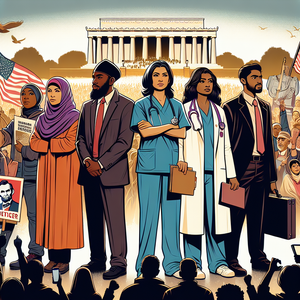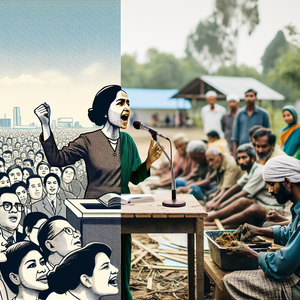Tim Walz's Role in Minnesota's Response to Social Justice Movements

George Floyd's death acted as a catalyst for change, igniting a movement that echoed the frustrations of countless individuals who had faced racial discrimination and police violence. Governor Walz's initial response included deploying the National Guard to Minneapolis to restore order amid widespread protests. While this was a necessary step to address immediate concerns, it also underscored the tension between maintaining public safety and acknowledging the urgent demand for social justice. Walz's reaction marked the beginning of a more nuanced approach to the challenges presented by the outcry for change, highlighting the need for deeper systemic reform.
Policy Initiatives and Legislative Actions
Recognizing the need for comprehensive police reform, Governor Walz's administration took significant legislative action in the aftermath of the protests. One of the cornerstone initiatives was the introduction of the "George Floyd Justice in Policing Act," which aimed to increase accountability for law enforcement officers. Key provisions included banning chokeholds, eliminating the use of no-knock warrants in drug cases, and enhancing transparency in police conduct. In addition, Walz's administration established the Minnesota Police Accountability Act, which sought to promote community oversight and establish a centralized database to track police misconduct. This initiative aimed to prevent officers with histories of excessive force from moving between departments unnoticed, thereby addressing one of the critical systemic issues in law enforcement.
Community Engagement and Listening Sessions
Understanding that effective governance requires community input, Walz emphasized the importance of directly engaging with Minnesotans affected by racial inequities. His administration organized a series of listening sessions across the state, providing a platform for marginalized voices to share their experiences and insights on necessary reforms. These sessions fostered a dialogue between community members, activists, and policymakers, allowing for insights that shaped legislative proposals. By prioritizing community engagement, Governor Walz aimed to build trust and ensure that the voices of those most impacted by systemic racism were heard and considered in the policymaking process.
Challenges and Criticisms
Despite these efforts, Walz's administration faced significant challenges and criticisms. Some activists argued that the measures implemented were insufficient and failed to address the root causes of systemic racism. The complexities of balancing public safety with calls for deep-rooted reform created a delicate situation for the governor, as he navigated a polarized political landscape. Opposition from certain factions highlighted the contentious nature of the discourse surrounding policing and social justice. The push for reform encountered resistance from those who prioritized law and order over systemic change, complicating the path forward for the Walz administration.
Supporting Examples: Personal Stories and Impact
To understand the real-world implications of Walz's policies, it is essential to consider the stories of individuals affected by systemic inequities. Community leaders like Nekima Levy Armstrong, a civil rights attorney and activist, have emphasized the importance of sustained efforts in promoting racial equity beyond mere policy changes. Personal accounts from those who have experienced racial profiling or police violence serve as powerful reminders of the urgency behind reform efforts. Another example of Walz's commitment to reform is the establishment of the Office of Community Safety, which aims to foster constructive relationships between law enforcement and the communities they serve. This initiative reflects a recognition of the trust gap that has long existed in Minnesota's policing landscape and underscores the governor's commitment to bridging that divide.
Governor Tim Walz's response to social justice movements in Minnesota represents a critical chapter in the ongoing struggle for racial equity. His administration has made strides in enacting meaningful reforms, but the road ahead is fraught with challenges. The ongoing dialogue between the government and communities, coupled with a commitment to transparency and accountability, will be essential in shaping Minnesota's future. As the state continues to navigate the complexities of social justice, it is clear that the legacy of these movements will have lasting effects on policy, governance, and the quest for equality. Tim Walz's role in this transformative period will be remembered as a pivotal moment in the journey toward a more just and equitable Minnesota.
Community Engagement Coordinator
Nonprofits, government agencies, and local advocacy groups
Job Responsibilities
Facilitate and organize community listening sessions to gather insights on social justice issues and community needs.
Develop outreach strategies to engage underrepresented populations in policy discussions and initiatives.
Collaborate with local organizations and stakeholders to build partnerships and foster community trust.
Skills
Strong communication
Cultural competency
Experience in community organizing
Policy Analyst in Criminal Justice Reform
Government agencies, think tanks, and nonprofit organizations focused on justice reform
Job Responsibilities
Conduct research and analysis on existing policing policies and their impact on communities of color.
Draft policy recommendations aimed at enhancing transparency and accountability in law enforcement practices.
Collaborate with lawmakers and advocacy groups to promote reform initiatives and legislative changes.
Skills
Strong analytical skills
Knowledge of criminal justice systems
Experience with advocacy
Diversity, Equity, and Inclusion (DEI) Specialist
Corporations, educational institutions, and public sector organizations
Job Responsibilities
Design and implement DEI training programs for organizations to address systemic racism and promote equitable practices.
Assess organizational policies and practices to identify barriers to inclusion and recommend actionable changes.
Monitor and report on diversity metrics to ensure accountability and progress towards equity goals.
Skills
Expertise in DEI principles
Strong facilitation skills
Experience in organizational development
Social Justice Advocate
Nonprofits, advocacy groups, and community organizations
Job Responsibilities
Develop and lead campaigns to raise awareness about social justice issues and mobilize community action.
Work with grassroots organizations to empower marginalized communities and advocate for policy changes.
Engage in public speaking and media relations to amplify the voices of those affected by systemic inequities.
Skills
Strong advocacy skills
Public relations experience
Deep understanding of social justice issues
Law Enforcement Accountability Officer
Government oversight agencies, civil rights organizations, and independent monitoring bodies
Job Responsibilities
Monitor police department practices and conduct investigations into allegations of misconduct and excessive force.
Collaborate with community oversight boards to enhance transparency and accountability within law enforcement.
Provide recommendations for policy changes aimed at improving police-community relations and reducing incidents of violence.
Skills
Knowledge of law enforcement practices
Investigative skills
Familiarity with civil rights law


